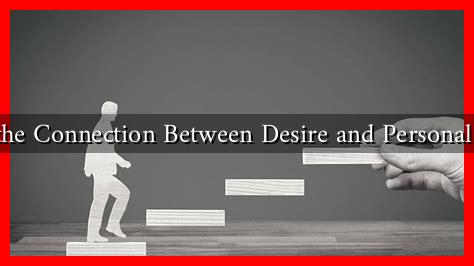-
Table of Contents
What Is the Connection Between Desire and Personal Growth?
Desire is a powerful force that drives human behavior and shapes our lives. It is the spark that ignites our ambitions, fuels our passions, and propels us toward personal growth. Understanding the connection between desire and personal growth can provide valuable insights into how we can harness our desires to achieve our goals and improve our lives. This article explores the intricate relationship between desire and personal growth, supported by research, examples, and practical applications.
The Nature of Desire
Desire can be defined as a strong feeling of wanting to have something or wishing for something to happen. It is a fundamental aspect of human psychology and can manifest in various forms, including:
- Material desires (e.g., wealth, possessions)
- Emotional desires (e.g., love, acceptance)
- Intellectual desires (e.g., knowledge, understanding)
- Spiritual desires (e.g., purpose, fulfillment)
Each type of desire can serve as a catalyst for personal growth, pushing individuals to pursue their goals and overcome obstacles. However, not all desires lead to positive outcomes; understanding the nature of our desires is crucial for personal development.
Desire as a Motivational Force
Desire is often the first step in the journey of personal growth. It acts as a motivational force that encourages individuals to take action. According to psychologist Abraham Maslow’s hierarchy of needs, desire plays a critical role in fulfilling our basic needs and achieving self-actualization. When we have a strong desire for something, we are more likely to:
- Set specific goals
- Develop a plan of action
- Overcome challenges and setbacks
- Persist in the face of adversity
For example, consider the case of J.K. Rowling, the author of the Harry Potter series. Her desire to tell a compelling story and share her imagination with the world drove her to write despite facing numerous rejections from publishers. Her unwavering desire ultimately led to her success and significant personal growth.
The Role of Desire in Self-Discovery
Desire also plays a crucial role in self-discovery, helping individuals understand their values, interests, and passions. Engaging with our desires can lead to profound insights about ourselves, including:
- Identifying what truly matters to us
- Recognizing our strengths and weaknesses
- Understanding our motivations and fears
For instance, a person who desires to travel may discover a passion for different cultures and languages, leading them to pursue a career in international relations or cultural studies. This journey of self-discovery is essential for personal growth, as it allows individuals to align their actions with their true selves.
Balancing Desire and Contentment
While desire is a powerful motivator, it is essential to balance it with contentment. Excessive desire can lead to dissatisfaction and a constant feeling of wanting more, which can hinder personal growth. Research indicates that individuals who practice gratitude and contentment are more likely to experience overall well-being and fulfillment.
To strike a balance, consider the following strategies:
- Practice mindfulness to stay present and appreciate what you have.
- Set realistic and achievable goals that align with your values.
- Reflect on your desires regularly to ensure they serve your personal growth.
Conclusion: Harnessing Desire for Personal Growth
The connection between desire and personal growth is profound and multifaceted. Desire serves as a motivational force that drives individuals to pursue their goals, facilitates self-discovery, and encourages resilience in the face of challenges. However, it is crucial to balance desire with contentment to foster a healthy mindset that promotes well-being.
By understanding and harnessing our desires, we can unlock our potential and embark on a journey of continuous personal growth. Whether through setting meaningful goals, engaging in self-reflection, or practicing gratitude, we can transform our desires into powerful tools for self-improvement. For further reading on this topic, consider exploring resources like [Psychology Today](https://www.psychologytoday.com) or [Mindful](https://www.mindful.org) for insights on personal development and mindfulness practices.

